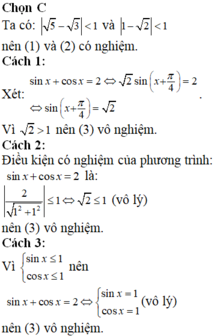
Hãy nhập câu hỏi của bạn vào đây, nếu là tài khoản VIP, bạn sẽ được ưu tiên trả lời.


\(\Leftrightarrow\frac{3^{\sin^2x}+3}{3^{\sin^2x}}-4=2^{2.\frac{x}{2}}+2^{2.\frac{-x}{2}}-2\)
\(\Leftrightarrow\frac{\left(3^{\sin^2x}-1\right)\left(3^{\sin^2x}-3\right)}{3^{\sin^2x}}=\left(2^{\frac{x}{2}}-2^{\frac{-x}{2}}\right)^2\)
Vì 0 \(\le\sin^2x\)\(\le1\) nên 1 \(\le3\sin^2x\)\(\le3\) . Suy ra Vế trái \(\le0\)\(\le\) vế phải và phương trình tương đương với hệ :
\(\begin{cases}\left(3^{\sin^2x}-1\right)\left(3^{\sin^2x}-3\right)=0\\2^{\frac{x}{2}}-2^{\frac{-x}{2}}=0\end{cases}\)
Từ phương trình thứ 2, dễ dàng suy ra x=0 (thỏa mãn). Vậy x=0 là nghiệm duy nhất của phương trình đã cho.

Chọn C
Ta có: ![]() nên (1) và (2) có nghiệm.
nên (1) và (2) có nghiệm.
Cách 1:
Xét: ![]()
![]() nên (3) vô nghiệm.
nên (3) vô nghiệm.
Cách 2:
Điều kiện có nghiệm của phương trình: sin x + cos x = 2 là: 
(vô lý) nên (3) vô nghiệm.
Cách 3:
Vì 

nên (3) vô nghiệm.

1)
Ta có \(P_1=\int \frac{\cos xdx}{2\sin x-7}=\int \frac{d(\sin x)}{3\sin x-7}\)
Đặt \(\sin x=t\Rightarrow P_1=\int \frac{dt}{3t-7}=\frac{1}{3}\int \frac{d(3t-7)}{3t-7}=\frac{1}{3}\ln |3t-7|+c\)
\(=\frac{1}{3}\ln |3\sin x-7|+c\)
2)
\(P_2=\int \sin xe^{2\cos x+3}dx\)
Đặt \(\cos x=t\)
\(P_2=-\int e^{2\cos x+3}d(\cos x)=-\int e^{2t+3}dt\)
\(=-\frac{1}{2}\int e^{2t+3}d(2t+3)=\frac{-1}{2}e^{2t+3}+c\)
\(=\frac{-e^{2\cos x+3}}{2}+c\)
3)
\(P_3=\int \frac{\sin x+x\cos x}{(x\sin x)^2}dx\)
Để ý rằng \((x\sin x)'=x'\sin x+x(\sin x)'=\sin x+x\cos x\)
Do đó: \(d(x\sin x)=(x\sin x)'dx=(\sin x+x\cos x)dx\)
Suy ra \(P_3=\int \frac{d(x\sin x)}{(x\sin x)^2}\)
Đặt \(x\sin x=t\Rightarrow P_3=\int \frac{dt}{t^2}=\frac{-1}{t}+c=\frac{-1}{x\sin x}+c\)

Lời giải:
Ta có:
\(A=\int \frac{x\sin x+\cos x}{x^2-\cos ^2x}dx=\int \frac{(\cos x-x)+x(\sin x+1)}{x^2-\cos ^2x}dx\)
\(=-\int \frac{dx}{\cos x+x}+\int \frac{x(\sin x+1)}{x^2-\cos ^2x}dx=-\int \frac{dx}{x+\cos x}+\frac{1}{2}\int (\sin x+1)\left(\frac{1}{x-\cos x}+\frac{1}{x+\cos x}\right)dx\)
\(=-\int \frac{dx}{x+\cos x}+\frac{1}{2}\int (\sin x+1)\frac{dx}{x-\cos x}+\frac{1}{2}\int (\sin x-1)\frac{dx}{x+\cos x}+\int \frac{dx}{x+\cos x}\)
\(=\frac{1}{2}\int (\sin x+1)\frac{dx}{x-\cos x}+\frac{1}{2}\int (\sin x-1)\frac{dx}{x+\cos x}\)
\(=\frac{1}{2}\int \frac{d(x-\cos x)}{x-\cos x}+\frac{1}{2}\int \frac{-d(x+\cos x)}{x+\cos x}\)
\(=\frac{1}{2}\ln |x-\cos x|-\frac{1}{2}\ln |x+\cos x|+c\)
Xét biểu thức $B$
\(B=\int \frac{\ln x-1}{x^2-\ln ^2x}dx=\int \frac{(\ln x-x)+(x-1)}{x^2-\ln ^2x}dx\)
\(=-\int \frac{dx}{x+\ln x}+\int \frac{x-1}{x^2-\ln ^2x}dx=-\int \frac{dx}{x+\ln x}+\frac{1}{2}\int \frac{(x-1)}{x}\left(\frac{1}{x-\ln x}+\frac{1}{x+\ln x}\right)dx\)
\(=-\int \frac{dx}{x+\ln x}+\frac{1}{2}\int \frac{1}{x-\ln x}.\frac{x-1}{x}dx+\frac{1}{2}\int \frac{1}{x+\ln x}.\frac{x-1}{x}dx\)
\(=-\int \frac{dx}{x+\ln x}+\frac{1}{2}\int \frac{1}{x-\ln x}.\frac{x-1}{x}dx-\frac{1}{2}\int \frac{1}{x+\ln x}.\frac{1+x}{x}dx+\int \frac{dx}{x+\ln x}\)
\(=\frac{1}{2}\int \frac{1}{x-\ln x}.\frac{x-1}{x}dx-\frac{1}{2}\int \frac{1}{x+\ln x}.\frac{1+x}{x}dx\)
\(=\frac{1}{2}\int \frac{d(x-\ln x)}{x-\ln x}-\frac{1}{2}\int \frac{d(x+\ln x)}{x+\ln x}\)
\(=\frac{1}{2}\ln |x-\ln x|-\frac{1}{2}\ln |x+\ln x|+c\)

Tính \(I=\int_0^{\dfrac{\pi}{2}}\dfrac{cos^{2017}x}{sin^{2017}x+cos^{2017}}dx\left(1\right)\)
Đặt \(t=cosx\Rightarrow sinx=\sqrt{1-cos^2x}\)
\(\Rightarrow dt=-sinx.dx\)
\(\Rightarrow I=\int_0^1\dfrac{t^{2017}.}{\sqrt{1-t^2}.\left(\left(\sqrt{1-t^2}\right)^{2017}+t^{2017}\right)}dt\)
Đặt: \(t=siny\Rightarrow\sqrt{1-t^2}=cosy\)
\(\Rightarrow dt=cosy.dy\)
\(\Rightarrow I=\int_0^{\dfrac{\pi}{2}}\dfrac{sin^{2017}y.cosy}{cosy\left(cos^{2017}y+sin^{2017}y\right)}dy=\int_0^{\dfrac{\pi}{2}}\dfrac{sin^{2017}y}{\left(cos^{2017}y+sin^{2017}y\right)}\)
\(\Rightarrow I=\int_0^{\dfrac{\pi}{2}}\dfrac{sin^{2017}x}{\left(cos^{2017}x+sin^{2017}x\right)}\left(2\right)\)
Cộng (1) và (2) ta được
\(2I=\int_0^{\dfrac{\pi}{2}}\dfrac{sin^{2017}x+cos^{2017}x}{sin^{2017}x+cos^{2017}x}dx=\int_0^{\dfrac{\pi}{2}}1dx\)
\(=x|^{\dfrac{\pi}{2}}_0=\dfrac{\pi}{2}\)
\(\Rightarrow I=\dfrac{\pi}{4}\)
Thế lại bài toán ta được
\(\dfrac{\pi}{4}+t^2-6t+9-\dfrac{\pi}{4}=0\)
\(\Leftrightarrow t^2-6t+9=0\)
\(\Leftrightarrow t=3\)
Chọn đáp án C
mỗi trắc nghiệm thoy mà lm dài ntn s @@
chắc lên đó khó lắm ag



Xét hàm số \(f\left(t\right)=t^{\cos\alpha}-t\cos\alpha\)
Ta có : \(f'\left(x\right)=\left(t^{\cos\alpha}-1\right)\cos\alpha\)
Khi đó \(f\left(3\right)=f\left(2\right)\) và \(f\left(1\right)\) khả vi liên tục trên \(\left[2;3\right]\) Theo định lí Lagrange thì tồn tại \(c\in\left[2;3\right]\) sao cho :
\(f'\left(c\right)=\frac{f\left(3\right)-f\left(2\right)}{3-2}\) hay \(\left(c^{\cos\alpha-1}-1\right)\cos\alpha\)
Từ đó suy ra :
\(\begin{cases}\cos\alpha=0\\\cos\alpha=1\end{cases}\)\(\Leftrightarrow\begin{cases}\alpha=\frac{\pi}{2}+k\pi\\\alpha=k\pi\end{cases}\) \(\left(k\in Z\right)\)
Thử lại ta thấy các giá trị này đều thỏa mãn
Vậy nghiệm của phương trình là \(x=\frac{\pi}{2}+k\pi;x=k\pi\) và \(\left(k\in Z\right)\)